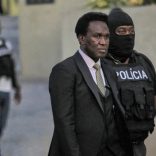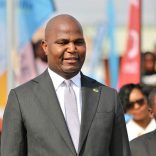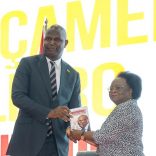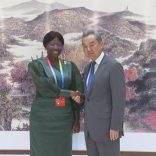Mozambique: Venâncio Mondlane congratulates Nobel Peace Prize winner - AIM
Mozambique President Daniel Chapo addresses United Nations General Debate – Watch

Photo: Presidency of the Republic of Mozambique
Statement summary
Daniel Francisco Chapo, President of Mozambique, highlighting the historic opinion of the International Court of Justice, issued on 23 July 2025, which unequivocally reaffirmed that States have binding legal obligations to protect the climate and the environment from greenhouse gas emissions, said: “This is a milestone of universal significance for countries such as Mozambique.” His country is among those that bear no historical responsibility for the climate crisis but are the hardest hit by its consequences, such as droughts, cyclones and floods. The World Court’s decision is “a call to climate justice, it’s a call to global solidarity”, he said.
The environmental crisis is compounded by technological challenges, he pointed out. Artificial intelligence and other emerging technologies offer extraordinary opportunities but also serious risks of exclusion, social manipulation and even militarization. “As long as we do not fully understand how these models work, we cannot entrust them with critical tasks,” he stressed, advocating for “a technological and climate diplomacy” capable of regulating risk and democratizing benefits through genuine sharing of technology. Science and technology must not become factors of exclusion but rather instruments of climate justice and inclusive development. Africa can and must play an active role in defining international standards, determining research priorities and ensuring that technology innovation is always at the service of humanity, he said.

Mozambique, as an African country, has distinguished itself in promoting democracy on the continent, he said. It has been working tirelessly to facilitate a robust democratic system and holding regular and transparent elections that reflect the will of its people. “Indeed, our presence in this podium is the result of a free and transparent process,” he said. Highlighting his country’s historic commitment to dialogue and building bridges, he said this is crucial for lasting peace achieved after decades of conflict. Drawing attention to a public consultation his Government launched on 10 September, he said it will ensure that all sectors of society, regardless of their origin or economic position, will have their concerns considered. This process will not only strengthen democracy in his country but ensure that its development reflects the aspirations of all Mozambicans without exception.
“We are proud of the progress we have made so far and we reaffirm our commitment to continue advancing as an example of democracy in Africa and of peaceful coexistence in the African continent and in the world,” he said, noting that during Mozambique’s term as a non-permanent member of the Security Council, that organ issued a presidential statement on the role of Africa in global affairs. Mozambique also contributed to the historic Council resolution 1719 (2023), which paved the way for predictable and sustainable financing for the African Union’s peace support operations. His country will keep advocating for a stronger African voice, with two permanent seats on the Security Council and greater decision-making powers in international financial institutions.

Calling for a new global financial architecture capable of alleviating debt, mobilizing financial resources for sustainable development and climate action as well as correcting historical asymmetries, he said that without inclusive multilateralism, the United Nations “can become an assembly of shareholders dominated by the richest”. International solidarity is not an act of charity, it is an act of unity amongst allies, he reminded the Assembly, calling on the international community to “renew our spirit of solidarity”.












Leave a Reply
Be the First to Comment!
You must be logged in to post a comment.
You must be logged in to post a comment.